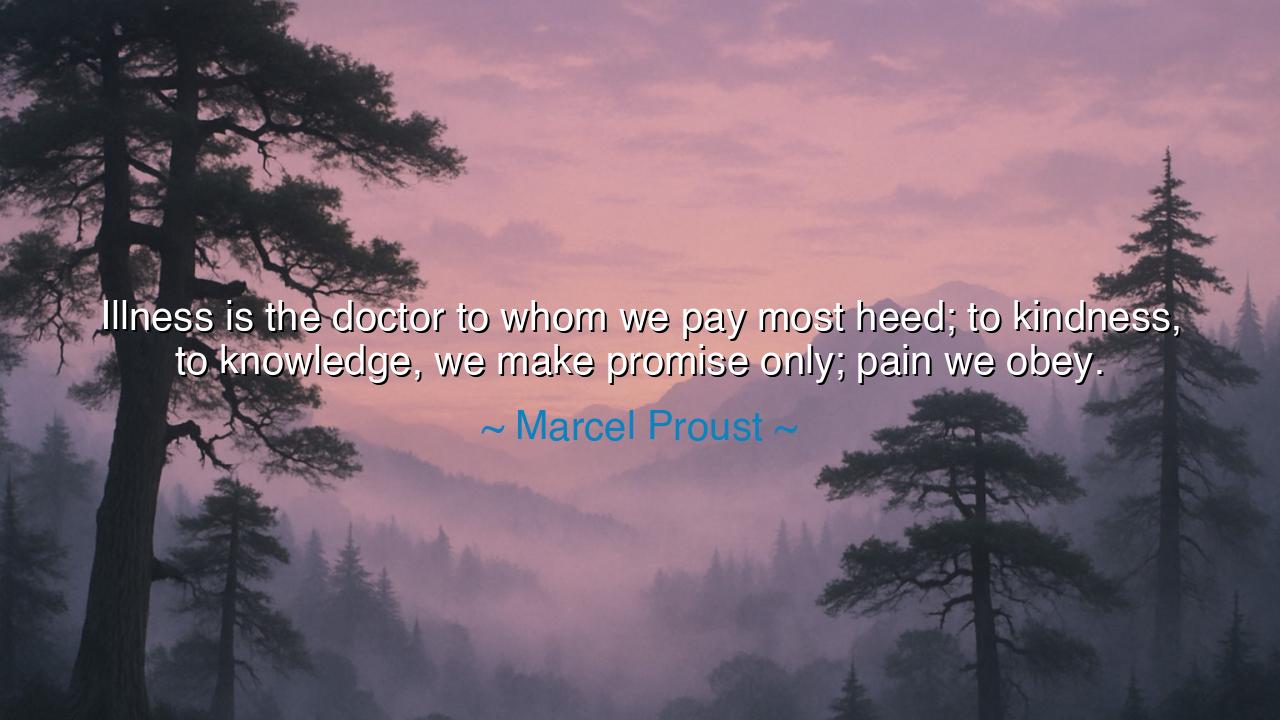
Illness is the doctor to whom we pay most heed; to kindness, to
Illness is the doctor to whom we pay most heed; to kindness, to knowledge, we make promise only; pain we obey.






Hear now the sorrowful yet piercing wisdom of Marcel Proust: “Illness is the doctor to whom we pay most heed; to kindness, to knowledge, we make promise only; pain we obey.” In these words, the French sage reveals a harsh truth about the human condition. We are creatures of promise, quick to bow our heads in agreement when counsel comes softly, but how easily do we stray when the voice of wisdom is gentle! Only when the fire of pain burns, only when the shadow of illness falls upon us, do we truly listen, truly change. This is the weakness of man—that he often learns not through kindness, nor through the quiet gift of knowledge, but through suffering.
The ancients themselves bore witness to this truth. The Stoics taught that hardship is the teacher of endurance, and that a man who has not suffered is like a blade that has never met the whetstone. Proust, frail in body, wracked by sickness, knew in his own flesh the authority of illness. He watched how men and women would dismiss the soft-spoken counsel of health, how they would ignore the call to moderation, to patience, to care for the body and soul. Yet when illness came—when the body broke, when pain gripped them—they obeyed. No argument was needed. No persuasion was required. Pain is the tyrant that none can resist.
History offers us a stark reminder: in London during the Great Plague of 1665, the city’s physicians and philosophers had long warned of cleanliness, of quarantine, of preparation. But their words fell like seeds upon stone. Only when the streets filled with the dead, only when the stench of decay rose, did the people obey. Then, in the face of illness, laws were enacted, habits were changed, and hearts were turned to humility. The doctor they had ignored in life was heeded only through the scourge of suffering.
Yet this truth is not only grim—it is also awakening. For if pain commands our obedience, it is also a messenger, harsh yet holy. The wound teaches us what health truly means. The nights of fever make the mornings of vitality precious. The sting of illness reminds us of the fragility of life, and in that fragility, we discover gratitude. Where kindness and knowledge were once ignored, pain engraves their worth upon our souls. Thus, though cruel, the doctor of illness leaves behind gifts—awareness, humility, reverence for what we had taken for granted.
The lesson, then, is not merely to lament. It is to learn before the whip of suffering falls. Do not wait for illness to teach you the value of health. Do not wait for pain to drive you into gratitude. Instead, let the voices of kindness and knowledge be honored now. Heed the advice of the wise before tragedy forces it upon you. Care for your body while it is strong, nurture your relationships while they are whole, seek truth while you have the leisure to pursue it. Let not pain alone be your teacher.
What must you do? Begin today with attentiveness. Listen when knowledge whispers, even if it does not command. Act upon kindness, even when it demands sacrifice. Treat every small ache, every faint warning, as the whisper of that stern doctor whom Proust described. For those who learn early, the lessons of illness may come lighter, and their journey may be steadier. To wait until pain forces obedience is to delay wisdom until the hour of suffering.
Therefore, remember this: illness is a hard master, but it need not be the only one. You have the power to learn from gentler teachers—kindness, knowledge, and foresight. Yet if you ignore them, know that pain will one day speak, and when it does, you will obey. Choose then, O seeker, to learn now from gentleness, lest the harsher voice of suffering be required to awaken you.






AAdministratorAdministrator
Welcome, honored guests. Please leave a comment, we will respond soon